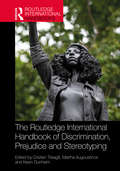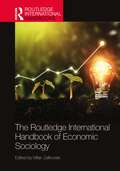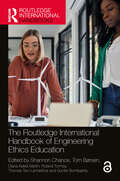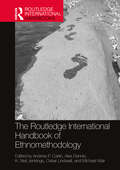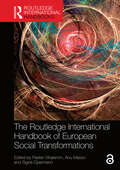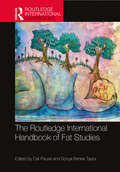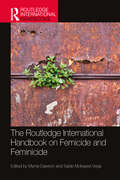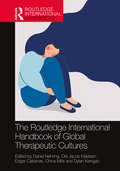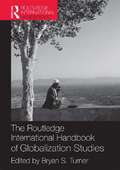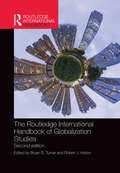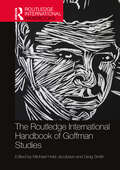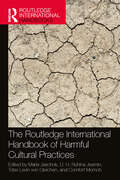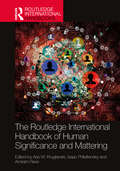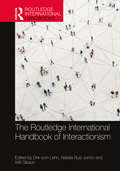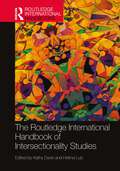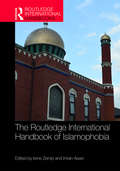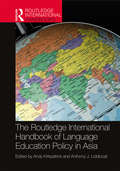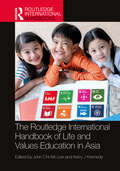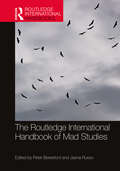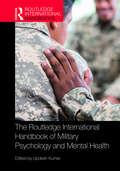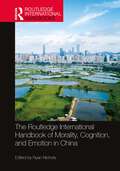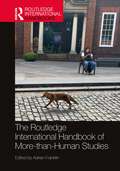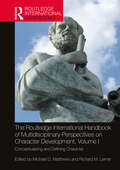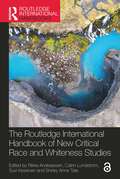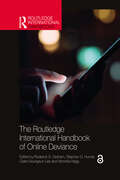- Table View
- List View
The Routledge International Handbook of Discrimination, Prejudice and Stereotyping (Routledge International Handbooks)
by Cristian Tileagă Martha Augoustinos Kevin DurrheimThis handbook explores prejudice, stereotyping and discrimination primarily as phenomena embedded in the social organization of societies and connected to structural factors and larger societal systems. It offers a unique critical and cross-disciplinary approach to the study of contemporary manifestations of prejudice, stereotyping and discrimination. New socio-psychological analyses of the most pressing social problems of our age bring into view future directions of research on prejudice, stereotyping and discrimination oriented to social change and collective action and that engage with wider systems of norms and discourse. The editors draw on social psychology, sociology, social policy, clinical psychology, cultural studies and feminist, antiracist and decolonizing social science to show how social psychology can successfully rekindle its intellectual dialogue with kindred social science fields to create broader foundations for the exploration of the paradoxes lodged at the heart of the social expression of prejudice in liberal democracies. This is essential reading for anyone interested in prejudice, discrimination and stereotypes. The handbook will be of interest to academics and researchers exploring both the quantitative and qualitative aspects of discrimination, inequality and social exclusion, as well as students undertaking masters or doctoral studies in social psychology, political psychology and political science.
The Routledge International Handbook of Economic Sociology (Routledge International Handbooks)
by Milan ZafirovskiThis handbook presents a systematic and comprehensive overview of economic sociology, an exemplary interdisciplinary field which draws on theoretical frameworks and empirical findings from both economics and sociology to present a unique lens on the interdependence of the economy and society. The handbook is arranged in four parts which together present the current state-of-the-art of economic sociology as well as pointing toward future directions for research. The first part outlines the theoretical foundations of economic sociology and its relations to other fields, particularly with regard to other alternative approaches to economics, and looks at conceptions and definitions of economic sociology vary. The second part provides an overview of the historical development of economic sociology from classical political economy to the present day. The third part explores the main problematics of economic sociology, analyzing the economy in relation to particular social institutions, the state, ideology, culture and art, religion, gender, race/ethnicity, and more. The fourth part focuses on the principal branches including sociology of the market, industrial organization and work, uncertainty, distribution and inequality, money and finance, and the environment. The stellar international cast of contributors is drawn from both economics and sociology, therefore presenting a holistic view of the field and contributing to a rejuvenation of economic sociology within economics. It is an indispensable reference work for researchers and students across a broad range of sociological and economic disciplines.
The Routledge International Handbook of Engineering Ethics Education (Routledge International Handbooks of Education)
by Shannon Chance and Tom BørsenResponding to the need for a timely and authoritative volume dedicated to this burgeoning and expansive area of research, this handbook will provide readers with a map of themes, topics, and arguments in the field of engineering ethics education (EEE).Featuring critical discussion, research collaboration, and a team of international contributors of globally recognized standing, this volume comprises six key sections which elaborate on the foundations of EEE, teaching methods, accreditation and assessment, and interdisciplinary contributions. Over 100 researchers of EEE from around the globe consider the field from the perspectives of teaching, research, philosophy, and administration. The chapters cover fast-moving topics central to our current understanding of the world such as the general data protection regulation (GDPR), artificial intelligence (AI), biotechnology, and ChatGPT; and they offer new insights into best practices research to equip program leaders and instructors delivering ethics content to students.This Open Access volume will be of interest to researchers, scholars, postgraduate students, and faculty involved with engineering education, engineering ethics, and philosophy of education. Curriculum designers, staff developers teaching pedagogical courses to faculty, and engineering professionals may also benefit from this volume.The Open Access version of this book, available at http://www.taylorfrancis.com, has been made available under a Creative Commons Attribution-Non Commercial-No Derivatives (CC-BY-NC-ND) 4.0 license.
The Routledge International Handbook of Ethnomethodology (Routledge International Handbooks)
by Alex Dennis K. Neil Jenkings Oskar Lindwall Andrew P. CarlinThis volume offers a comprehensive overview of the most pressing issues and developments in the field of ethnomethodology, including ethnomethodological conversation analysis, and highlights new and emerging areas for research. With truly authoritative coverage of the state of the art, including current debates, methodological issues, emerging topics for inquiry, new perspectives on established topics, empirical studies, and resources for study, The Routledge International Handbook of Ethnomethodology features lively, challenging discussions by a diverse range of international practitioners that will provide readers with unrivalled scholarship on ethnomethodology and conversation analysis for years to come. Sections include "Contexts and New Resources", "Theoretical Orientations", "Study Approaches", "Lay and Professional Analysis" and "Areas of Application". Moving past the focus on Garfinkel’s "discovery" of the field as a domain of study in the 1950s, and acknowledging how ethnomethodology has changed since then by accounting for both the phenomenologically informed and Wittgensteinian emphases in ethnomethodology, this Handbook constitutes an important update on the study and complexity of the topic. As such, The Routledge International Handbook of Ethnomethodology will be a valuable point of reference for students and scholars across the fields of sociology, communication and science studies, interaction studies, language and linguistics, among others.
The Routledge International Handbook of European Social Transformations (Routledge International Handbooks)
by Peeter Vihalemm Anu Masso Signe OpermannThis book focuses on social transformations as one of the central topics in the social sciences. The study of European social transformations is very valuable in the context of universal discussions within social sciences: explaining invariable, universal attributes of societies and examining changing attributes. The book consists of 20 chapters on European social transformations, written from the perspectives of distinguished scholars from such disciplines as economics, political science, educational science, geography, media and communication studies, public management and administration, social psychology and sociology. The temporal and spatial range of the book is wide, including such global changes as time-space compression, focusing particularly on change processes in Europe during the last two decades. The book consists of four main parts, beginning with an overview of the theoretical and methodological approaches, and then focusing separately on post-communist transformations, institutional drivers of social transformations in the European Union, and European transformations in the context of global processes. The book presents current theoretical, empirical and methodological approaches that complement the scientific literature on social transformations. This book is both an invaluable resource for scholars and an indispensable teaching tool for use in the classroom and will be of interest to students, academics, and policy-makers studying how this diverse region has changed over recent years.
The Routledge International Handbook of Fat Studies (Routledge International Handbooks)
by Cat Pausé; Sonya Renee TaylorThe Routledge International Handbook of Fat Studies brings together a diverse body of work from around the globe and across a wide range of Fat Studies topics and perspectives. The first major collection of its kind, it explores the epistemology, ontology, and methodology of fatness, with attention to issues such as gender and sexuality, disability and embodiment, health, race, media, discrimination, and pedagogy. Presenting work from both scholarly writers and activists, this volume reflects a range of critical perspectives vital to the expansion of Fat Studies and thus constitutes an essential resource for researchers in the field.
The Routledge International Handbook of Femicide and Feminicide (Routledge International Handbooks)
by Myrna Dawson Saide Mobayed VegaThis volume explores in depth femicide and feminicide, bringing together our current knowledge on this phenomenon and its prevention.No country is free from femicide/feminicide, which represents the tip of the iceberg in male violence against women and girls. Therefore, it is crucial and timely to better understand how states and their citizens are experiencing and responding to femicide/feminicide globally. Through the work of internationally recognised feminist and grassroots activists, researchers, and academics from around the world, this handbook offers the first in-depth, global examination of the growing social movement to address femicide and feminicide. It includes the current state of knowledge and the prevalence of femicide/feminicide and its characteristics across countries and world regions, as well as the social and legal responses to these killings. The contributions contained here look at the accomplishments of the past four decades, ongoing challenges, and current and future priorities to identify where we need to go from here to prevent femicide/feminicide specifically and male violence against women and girls overall.This transnational, multidisciplinary, cross-sectoral handbook will contribute to research, policy, and practice globally at a time when it is needed the most. It brings a visible, global focus to the growing concern about femicide/feminicide, underscoring the importance of adopting a human rights framework in working towards its prevention, in an increasingly unstable global world for women and girls.
The Routledge International Handbook of Global Therapeutic Cultures (Routledge International Handbooks)
by Daniel Nehring, Ole Jacob Madsen, Edgar Cabanas, China Mills, and Dylan KerriganThe Routledge International Handbook of Global Therapeutic Cultures explores central lines of enquiry and seminal scholarship on therapeutic cultures, popular psychology, and the happiness industry. Bringing together studies of therapeutic cultures from sociology, anthropology, psychology, education, politics, law, history, social work, cultural studies, development studies, and American Indian studies, it adopts a consciously global focus, combining studies of the psychologisation of social life from across the world. Thematically organised, it offers historical accounts of the growing prominence of therapeutic discourses and practices in everyday life, before moving to consider the construction of self-identity in the context of the diffusion of therapeutic discourses in connection with the global spread of capitalism. With attention to the ways in which emotional language has brought new problematisations of the dichotomy between the normal and the pathological, as well as significant transformations of key institutions, such as work, family, education, and religion, it examines emergent trends in therapeutic culture and explores the manner in which the advent of new therapeutic technologies, the political interest in happiness, and the radical privatisation and financialisation of social life converge to remake self-identities and modes of everyday experience. Finally, the volume features the work of scholars who have foregrounded the historical and contemporary implication of psychotherapeutic practices in processes of globalisation and colonial and postcolonial modes of social organisation. Presenting agenda-setting research to encourage interdisciplinary and international dialogue and foster the development of a distinctive new field of social research, The Routledge International Handbook of Global Therapeutic Cultures will appeal to scholars across the social sciences with interests in the advance of therapeutic discourses and practices in an increasingly psychologised society.
The Routledge International Handbook of Globalization Studies: Second Edition (Routledge International Handbooks)
by Bryan S. TurnerThe Routledge International Handbook of Globalization Studies offers students clear and informed chapters on the history of globalization and key theories that have considered the causes and consequences of the globalization process. There are substantive sections looking at demographic, economic, technological, social and cultural changes in globalization. The handbook examines many negative aspects – new wars, slavery, illegal migration, pollution and inequality – but concludes with an examination of responses to these problems through human rights organizations, international labour law and the growth of cosmopolitanism. There is a strong emphasis on interdisciplinary approaches with essays covering sociology, demography, economics, politics, anthropology and history. The Handbook, written in a clear and direct style, will appeal to a wide audience. The extensive references and sources will direct students to areas of further study.
The Routledge International Handbook of Globalization Studies: Second edition (Routledge International Handbooks)
by Bryan S. Turner Robert J. HoltonThe second edition of the Routledge International Handbook of Globalization Studies offers students clear and informed chapters on the history of globalization and key theories that have considered the causes and consequences of the globalization process. There are substantive sections looking at demographic, economic, technological, social and cultural changes in globalization. The handbook examines many negative aspects – new wars, slavery, illegal migration, pollution and inequality – but concludes with an examination of responses to these problems through human rights organizations, international labour law and the growth of cosmopolitanism. There is a strong emphasis on interdisciplinary approaches with essays covering sociology, demography, economics, politics, anthropology and history. The second edition has been completely revised and features important new thinking on themes such as Islamophobia and the globalization of religious conflict, shifts in global energy production such as fracking, global inequalities, fiscal transformations of the state and problems of taxation, globalization and higher education, and an analysis of the general sense of catastrophe that surrounds contemporary understandings of the consequences of a global world.
The Routledge International Handbook of Goffman Studies (Routledge International Handbooks)
by Greg Smith Michael Hviid JacobsenThis book explores the fertility and enigma of Erving Goffman’s sociological reasoning and its capacity to shed fresh light on the fundamental features of human sociality. Thematically arranged, it brings together the work of leading scholars of Goffman’s work to explore the concepts and themes that define Goffman’s analytical preoccupations, examining the ways these ideas have shaped significant fields of study and situating Goffman’s sociology in comparison to some eminent thinkers often linked with his name. Through a series of chapters informed by the same inventive and imaginative spirit characteristic of Goffman’s sociology, the book presents fresh perspectives on his contribution to the field and reveals the value of his thought for a variety of disciplines now increasingly aware of the importance of Goffman’s sociology to a range of social phenomena. A fresh perspective on the legacy of one of sociology’s most important figures, The Routledge International Handbook of Goffman Studies will appeal to scholars across the social sciences with interests in interactionist and micro-sociological perspectives.
The Routledge International Handbook of Harmful Cultural Practices (Routledge International Handbooks)
by Maria Jaschok Comfort Momoh U. H. Ruhina Jesmin Tobe Levin von GleichenThis handbook looks at cross-cultural work on harmful cultural practices considered gendered forms of abuse of women. These include female genital mutilation (FGM), virginity testing, hymenoplasty, and genital cosmetic surgery. Bringing together comparative perspectives, intersectionality, and interdisciplinarity, it uses feminist methodology and mixed methods, with ethnography of central importance, to provide holistic, grounded theorizing within a framework of transformative research. Taking female genital mutilation, a topical, contested practice, and making it a heuristic reference for related procedures makes the case for global action based on understanding the complexity of harmful cultural practices that are contextually differentiated and experienced in intersectional ways. But because this phenomenon is enshrouded in matters of sensitivity and prejudice, narratives of suffering are muted and even suppressed, are dismissed as indigenous ritual, or become ammunition for racist organizing. Such conflicted and often opaque debates obstruct clear vision of the scale of both problem and solution. Divided into six parts: • Discourses and Epistemological Fault Lines• FGM and Related Patriarchal Inscriptions • Gender and Genitalia • Female Bodies and Body Politics: Economics, Law, Medicine, Public Health, and Human Rights • Placing Engagement, Innovation, Impact, Care • Words and Texts to Shatter Silence Comprised of 24 newly written chapters from experts around the world, this book will be of interest to scholars and students of nursing, social work, and allied health more broadly, as well as sociology, gender studies, and postcolonial studies.
The Routledge International Handbook of Human Significance and Mattering (Routledge International Handbooks)
by Isaac Prilleltensky Arie W. Kruglanski Amiram RavivThis innovative book addresses the need for significance and mattering as a universal human motivation. It examines the impact of significance and mattering, considering how they manifest across our lifespan and in different parts of our lives.Written by a team of eminent authors with expertise in diverse psychological fields, the book explores how significance and mattering extend to almost all social domains, including families, schools, colleges, groups, workplaces, communities, and nations. The book is divided into four main parts, which consider the impact of significance and mattering across the life span, across life domains, across societies and cultures, and in mental health. The chapters outline how significance and mattering power race and gender politics, shape attitudes toward immigration, drive violent extremism, and underlie mental health issues, such as loneliness, and narcissism. The book considers the quest for significance as a fundamental motive in our personal interactions and in how society operates as a whole.Providing a truly comprehensive coverage of a ubiquitous psychological dynamic that affects all aspects of our lives, this book will be highly relevant for researchers, academics, practitioners, and students in psychology, social sciences, education, social work, and therapeutic professions. In addition, the book should appeal to organizational, political, and community leaders and the general public interested in human behavior and social problems.
The Routledge International Handbook of Interactionism (Routledge International Handbooks)
by Dirk vom Lehn; Natalia Ruiz-Junco; Will GibsonThe Routledge International Handbook of Interactionism demonstrates the promise and diversity of the interactionist perspective in social science today, providing students and practitioners with an overview of the impressive developments in interactionist theory, methods and research. Thematically organized, it explores the history of interactionism and the contemporary state of the field, considering the ways in which scholars approach topics that are central to interactionism. As such, it presents discussions of self, identity, gender and sexuality, race, emotions, social organization, media and the internet, and social problems. With attention to new developments in methods and methodologies, including digital ethnography, visual methods and research ethics, the authors also engage with new areas of investigation that have emerged in light of current societal developments, such as policing and police violence, interactionism beyond binaries and social media. Providing a comprehensive overview of the current state and possible future of interactionist research, it will appeal to interactionist scholars, as well as to established sociologists and students of sociology who have an interest in latest developments in interactionism.
The Routledge International Handbook of Intersectionality Studies (Routledge International Handbooks)
by Helma Lutz Kathy DavisIntersectionality is one of the most popular theoretical paradigms in gender studies and feminist theory today. Initially developed to explore how gender and race interact in the experiences of US women of colour, it has since been taken up in different disciplines and national contexts, where it is used to investigate a wide range of intersecting social identities and experiences of exclusion and subordination. This volume explores intersectionality studies as a burgeoning international field with a growing body of research, which is increasingly drawn upon in policy, political interventions, and social activism. Bringing together contributors from different disciplines and locations, The Routledge International Handbook of Intersectionality Studies maps the history and travels of intersectionality between continents and countries and takes up debates surrounding the privileged role of race in intersectional analysis, the ways in which intersectional analysis should or should not be carried out, and the political implications of thinking intersectional analysis and thought. Opening up new avenues of enquiry for a future generation of scholars and practitioners, it will appeal to scholars of sociology, gender studies, politics, and cultural studies with interests in feminist thought, social identity, social exclusion, and social inequality.
The Routledge International Handbook of Islamophobia (Routledge International Handbooks)
by Imran Awan Irene ZempiIslamophobic hate crimes have increased significantly following the terrorist attacks of 9/11 and 7/7. More recently, the rhetoric surrounding Trump’s election and presidency, Brexit, the rise of far-right groups and ISIS-inspired terrorist attacks worldwide have promoted a climate where Islamophobia and anti-Muslim sentiments have become ‘legitimised’. The Routledge International Handbook of Islamophobia provides a comprehensive single-volume collection of key readings in Islamophobia. Consisting of 32 chapters accessibly written by scholars, policy makers and practitioners, it seeks to examine the nature, extent, implications of, and responses to Islamophobic hate crime both nationally and internationally. This volume will appeal to undergraduate and postgraduate students as well as postdoctoral researchers interested in fields such as Criminology, Victimology, Sociology, Social Policy, Religious Studies, Law and related Social Sciences subjects. It will also appeal to scholars, policy makers and practitioners working in and around the areas of Islamophobic hate crimes.
The Routledge International Handbook of Language Education Policy in Asia (Routledge International Handbooks)
by Andy Kirkpatrick Anthony J. LiddicoatThis must-have handbook offers a comprehensive survey of the field. It reviews the language education policies of Asia, encompassing 30 countries sub-divided by regions, namely East, Southeast, South and Central Asia, and considers the extent to which these are being implemented and with what effect. The most recent iteration of language education policies of each of the countries is described and the impact and potential consequence of any change is critically considered. Each country chapter provides a historical overview of the languages in use and language education policies, examines the ideologies underpinning the language choices, and includes an account of the debates and controversies surrounding language and language education policies, before concluding with some predictions for the future.
The Routledge International Handbook of Life and Values Education in Asia (Routledge International Handbooks of Education)
by John Chi-Kin Lee Kerry J KennedyThis Handbook provides a comprehensive look at the educational scope of life and values that characterize 21st-century Asia, as well as those values shared across cultures.Some values are deeply resonant with the region’s past while others reflect modernity and the new contexts in which Asian societies find themselves. Exploring these values of different types and the way they are constructed in Eastern and Western contexts, the contributors delve into the diversity of religious, moral and social education to promote greater understanding across cultures. While a range of values is identified here, there is no single set of values that can be applied to all people in all contexts. The time has long gone, even for single societies, when values can be imposed. Yet this Handbook emphasizes both the extent and importance of values to individuals and their societies—how they respond to these values may provide the key to better and more caring societies and to better lives for all.Academics and teachers will find this Handbook resourceful because it raises important theoretical issues related to social values and their formation in distinctive contexts and provides novel insights into the diverse educational landscape in Asia. Policymakers and educators will also find this text helpful in learning to think about new ways to improve the quality of people’s lives.
The Routledge International Handbook of Mad Studies (Routledge International Handbooks)
by Peter BeresfordBy drawing broadly on international thinking and experience, this book offers a critical exploration of Mad Studies and advances its theory and practice. Comprised of 34 chapters written by international leading experts, activists and academics, this handbook introduces and advances Mad Studies, as well as exploring resistance and criticism, and clarifying its history, ideas, what it is, and what it can offer. It presents examples of mad studies in action, covering initiatives that have been taken, their achievements and what can be learned from them. In addition to sharing research findings and evidence, the book offers examples and insights for advancing understandings of experiences of madness and distress from the perspectives of those who have (had) those experiences, and also explores ways of supporting people oppressed by conventional understandings and systems. This book will be of interest to all scholars and students of Mad Studies, disability studies, sociology, socio- legal studies, mental health and medicine more generally.
The Routledge International Handbook of Military Psychology and Mental Health (Routledge International Handbooks)
by Updesh KumarMilitary psychology has become one of the world’s fastest-growing disciplines with ever-emerging new applications of research and development. The Routledge International Handbook of Military Psychology and Mental Health is a compendium of chapters by internationally renowned scholars in the field, bringing forth the state of the art in the theory, practice and future prospects of military psychology. This uniquely interdisciplinary volume deliberates upon the current issues and applications of military psychology not only within the military organization and the discipline of psychology, but also in the larger context of its role of building a better world. Split into three parts dedicated to specific themes, the first part of the book, "Military Psychology: The Roots and the Journey," provides an overview of the evolution of the discipline over the years, delving into concepts as varied as culture and cognition in the military, a perspective on the role of military psychology in future warfare and ethical issues. The second part, "Soldiering: Deployment and Beyond," considers the complexities involved in soldiering in view of the changing nature of warfare, generating a focal discourse on various aspects of military leadership, soldier resilience and post-traumatic growth in the face of extreme situations, bravery and character strengths and transitioning to civilian life. In the final section, "Making a Choice: Mental Health Issues and Prospects in the Military," the contributors focus on the challenges and practices involved in maintaining the mental health of the soldier, covering issues ranging from stress, mental health and well-being, through to suicide risk and its prevention, intervention and management strategies, moral injury and post-traumatic stress disorder. Incorporating enlightening contributions of eminent scholars from around the world, the volume is a comprehensive repository of current perspectives and future directions in the domain of military psychology. It will prove a valuable resource for mental health practitioners, military leaders, policy-makers and academics and students across a range of disciplines.
The Routledge International Handbook of Morality, Cognition, and Emotion in China (Routledge International Handbooks)
by Ryan NicholsThis ground-breaking handbook provides multi-disciplinary insight into Chinese morality, cognition and emotion by collecting in one place a comprehensive collection of essays focused on Chinese morality by world-leading experts from more than a dozen different academic fields of study. Through fifteen substantive chapters, readers are offered a holistic look into the ways morality could be interpreted in China, and a broad range of theoretical perspectives, including ecological, anthropological and cultural neuroscience. Offering a syncretic, multi-disciplinary overview that moves beyond the usual western-oriented perspective of China as a monolithic culture, research questions addressed in this book focus on morality as represented at the level of the individual, rather than at the group or institutional levels. Research questions explored herein include: What are the major contours of distinctively Chinese morality? What was the role of the ancient ecology, climate, and pathogen load in producing Chinese moral attitudes and emotions? Are ingredients of the good life in China different than ingredients of the good life elsewhere? How are children in China morally educated? How do findings from cultural neuroscience help us understand differences in the treatment of family members, or the treatment of strangers, in China and elsewhere? How do the protests in Hong Kong participate in, or stand apart from, the ongoing ethics of protest in historical China? The clear structure and accessible writing offer a rigorous assessment of the ways in which morality can be interpreted, shedding light on differences between China and Western cultures. The book also provides a timely window into Chinese forms of morality, and the pivotal role these play in social organization, family relationships, systems of government, emotion and cognition. Representing fields of study ranging from philosophy, linguistics, archaeology, history, and religion, to social psychology, neuroscience, clinical psychology, developmental psychology, and behavioral ecology, this is an essential text for students, academics, and others with wide interest in Chinese culture.
The Routledge International Handbook of More-than-Human Studies (Routledge International Handbooks)
by Adrian FranklinThis volume provides a state-of-the-art overview of the field of more-than-human studies, bringing together contemporary and essential content from leading authors across the discipline. With attention to the intellectual history of the field, its developments and extensions, its applications and its significance to contemporary society, it presents empirical studies and theoretical work covering long-established disciplines, as well as new writing on art, history, politics, planning, architecture, research methodology and ethics. An elaboration of the various dimensions of more-than-human studies, The Routledge International Handbook of More-than-Human Studies constitutes essential reading for anyone studying or researching in this field.
The Routledge International Handbook of Multidisciplinary Perspectives on Character Development, Volume I: Conceptualizing and Defining Character (Routledge International Handbooks)
by Richard M. Lerner Michael D. MatthewsDrawing from philosophy, religion, biology, behavioral and social sciences, and the arts, The Routledge International Handbooks of Multidisciplinary Perspectives on Character Development, Volumes I and II, present cutting-edge scholarship about the concept of character across the life span, the developmental and contextual bases of character, and the key organizations of societal sectors, within and across nations, that promote character development in individuals, families, and communities.This first volume, Conceptualizing and Defining Character, explores the foundations of the field by providing an array of interdisciplinary approaches to character development, including economics, education, law, literature, military science, philosophy, and many more. With contributions from international experts, Volume I brings together cutting-edge research and discusses instances of character development, including civic character, courage, fairness, forgiveness, gratitude, morality, tolerance, and thankfulness.This comprehensive publication is an essential reference for researchers and graduate students in behavioral sciences, biology, philosophy, theology, and economics, as well as practitioners leading or evaluating character education or character development programs around the world.Find Volume II: Moderators, Threats, and Contexts here: www.routledge.com/9781032172453
The Routledge International Handbook of New Critical Race and Whiteness Studies (Routledge International Handbooks)
by Shirley Anne Tate Catrin Lundström Rikke Andreassen Suvi KeskinenSince its foundation as an academic field in the 1990s, critical race theory has developed enormously and has, among others, been supplemented by and (dis)integrated with critical whiteness studies. At the same time, the field has moved beyond its origins in Anglo-Saxon environments, to be taken up and re-developed in various parts of the world – leading to not only new empirical material but also new theoretical perspectives and analytical approaches. Gathering these new and global perspectives, this book presents a much-needed collection of the various forms, sophisticated theoretical developments and nuanced analyses that the field of critical race and whiteness theories and studies offers today. Organized around the themes of emotions, technologies, consumption, institutions, crisis, identities and on the margin, this presentation of critical race and whiteness theories and studies in its true interdisciplinary and international form provides the latest empirical and theoretical research, as well as new analytical approaches. Illustrating the strength of the field and embodying its future research directions, The Routledge International Handbook of New Critical Race and Whiteness Studies will appeal to scholars across the social sciences and humanities with interests in race and whiteness.Chapter 34 of this book is freely available as a downloadable Open Access PDF at http://www.taylorfrancis.com under a Creative Commons [Attribution-Non Commercial-No Derivatives (CC-BY-NC-ND)] 4.0 license.
The Routledge International Handbook of Online Deviance (Routledge International Handbooks)
by Claire Seungeun Lee Veronika Nagy Roderick S. Graham Stephan G. HumerCovering a wide range of different online platforms, including social media sites and chatrooms, this volume is a comprehensive exploration of the current state of sociological and criminological scholarship focused on online deviance.Understanding deviance broadly, the handbook acknowledges both an objective normative approach and a subjective, reactivist approach to the topic, putting into sharp relief the distinctions between cybercrime and online deviance on the one hand, and wider concerns of online communities related to online deviance on the other. Divided into five sections, the first section is devoted primarily to scholarship about the theories and methods foundational to exploring online deviance. The second section, “Gender, Sex, and Sexuality”, presents empirical research on expressions of gender, sex, and sexuality in online spaces considered deviant. The third section, “Violence and Aggression,” highlights scholarship on types of violent communications such as hate speech and cyberstalking. The fourth section, “Communities and Culture,” describes empirical research on online communities and networks that can be described as deviant by wider society. Lastly, the fifth section, “Regional Perspectives,” highlights research in which a terrestrial location is impactful to the online phenomena studied.Providing a window into future scholarship over the next several years and acknowledging the ephemeral nature of research on digital technology, The Routledge International Handbook on Online Deviance is essential reading for students and scholars of Criminology and Sociology focused on deviant online behaviour. It will also appeal to those working in related areas within Internet/Digital Studies, Media/Communication Studies, Psychology, and Cybersecurity.
